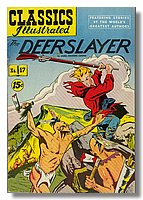|
|
Online Texts for Craig White's Literature Courses
|
|
|
Selections from James Fenimore Cooper The Deerslayer or The First War-Path (1841) |
|
The Deerslayer
of 1841, the last of the Leather-Stocking Tales to be written, is set earliest
in the Leather-Stockingís life, about age 20. The novel ends with a
flash-forward 15 years later, as the Leather-Stocking, Chingachgook, and Uncas
journey toward the scene of Last of the
Mohicans but pause to visit the scene of
The Deerslayer, which takes place
near Lake Otsego, where Cooperstown (named for Cooperís father) would rise.
from Chapter 31
http://www.gutenberg.org/files/3285/3285-h/3285-h.htm
For some time Deerslayer was irresolute as to his course;
but, in the end, he retraced his steps, and joined the
The war that then had its rise was stirring and bloody. The
Fifteen years had passed away,
ere it was in the power of the Deerslayer to revisit the Glimmerglass
[
The following morning, the youth
[Uncas]
discovered one of the canoes drifted on the shore, in a
state of decay. A little labor put it in a state for service, and they all
embarked, with a desire to examine the place. All the points were passed, and
Chingachgook pointed out to his son the
spot where the Hurons had first encamped, and the point whence he had succeeded
in stealing his bride
[rescuing Hist from captivity].
Here they even landed, but all traces of the former visit had disappeared. Next
they proceeded to the scene of the battle, and there they found a few of the
signs that linger around such localities. Wild beasts had disinterred many of
the bodies, and human bones were bleaching in the rains of summer. Uncas
regarded all with reverence and pity, though traditions were already rousing his
young mind to the ambition and sternness of a warrior.
From the point, the canoe took its way toward the shoal,
where the remains of the castle
[an outpost built by an early explorer in
Deerslayer]
were still visible,
a picturesque ruin. The storms of
winter had long since unroofed the house, and decay had eaten into the logs.
All the fastenings were untouched, but the seasons rioted in the place, as if in
mockery at the attempt to exclude them. The palisades
[defensive fencing]
were rotting, as were the piles, and it was evident that
a few more recurrences of winter, a few
more gales and tempests, would sweep all into the lake, and blot the building
from the face of that magnificent solitude. The graves could not be found.
Either the elements had obliterated their traces, or time had caused those who
looked for them to forget their position.
The
A few miles farther up the lake, another of the canoes was discovered, and on
the point where the party finally landed, were found those which had been left
there upon the shore. That in which the present navigation was made, and the one
discovered on the eastern shore, had dropped through the decayed floor of the
castle, drifted past the falling palisades, and had been thrown as waifs upon
the beach.
From all these signs, it was
probable the lake had not been visited
since the occurrence of the final scene of our tale. Accident or tradition had
rendered it again a spot sacred to nature, the frequent wars and the feeble
population of the colonies still confining the settlements within narrow
boundaries. Chingachgook and his friend left the spot with
melancholy feelings. It had been the
region of their First War Path, and it carried back the minds of both to scenes
of tenderness, as well as to hours of triumph. They held their way towards
the Mohawk [River] in silence, however, to rush into
new adventures, as stirring and as
remarkable as those which had attended their opening careers on this lovely
lake. At a later day they returned to the place, where the Indian found a grave.
[In the first Leather-Stocking Tale,
The Pioneers (1823), the aging
Chingachgook dies and is buried by
Time and circumstances have drawn an impenetrable mystery around all else
connected with the Hutters
[the family including Judith who lived in the Castle and
the
The same fate attended Judith. When Hawkeye reached the
garrison on the Mohawk he enquired anxiously after that lovely but misguided
creature. None knew heróeven her person was no longer remembered. Other officers
had, again and again, succeeded the Warleys and Craigs and Grahams, though an
old sergeant of the garrison, who had lately come from England, was enabled to
tell our hero that Sir Robert Warley lived on his paternal estates, and that
there was a lady of rare beauty in
the Lodge who had great influence over
him, though she did not bear his name. Whether this was Judith relapsed into
her early failing, or some other victim of the soldier's, Hawkeye never knew,
nor would it be pleasant or profitable to inquire. We live in a world of
transgressions and selfishness, and no pictures that represent us otherwise can
be true, though, happily, for human nature, gleamings of that pure spirit in
whose likeness man has been fashioned are to be seen, relieving its deformities,
and mitigating if not excusing its crimes.
![]()
![]()


